Chapter 25 - Surface Areas and Volume of Solids Exercise Ex. 25.1
Question 1
The volume of a cube is 1331 cm3. Find
its total surface area.
Solution 1
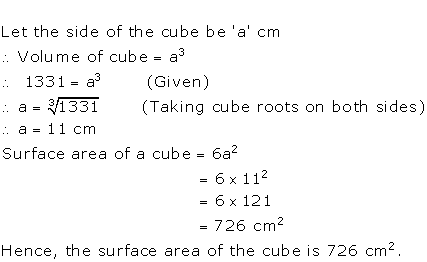
Question 2
The total surface area of a cube is 864 cm2.
Find its volume.
Solution 2
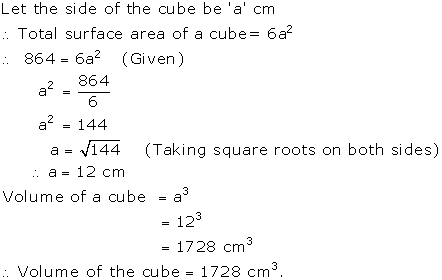
Question 3
The length, breadth, and height of a rectangular
solid are in the ratio 6 : 4 :3. If the total
surface area is 1728 cm2. Find its dimensions.
Solution 3
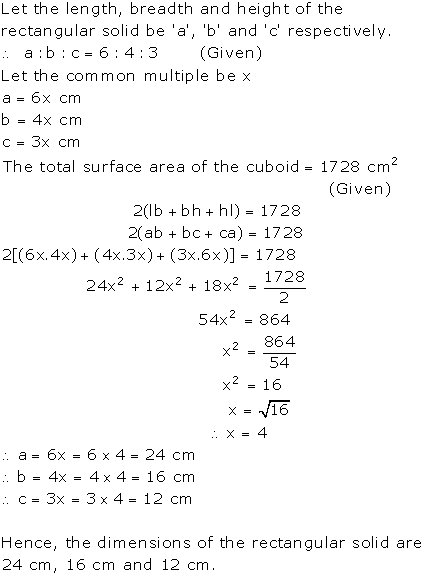
Question 4
The length and breadth of a cuboid
are 20 cm and 15 cm respectively. If its volume is 2400 cm3, find
its height.
Solution 4
Volume of
a cuboid = l x b x h
---------------------2400 = 20
× 15 × h
---------------------------h = 8 cm
Hence,
height of the cuboid is 8 cm.
Question 5
A square plate of side 'x' cm is 4 mm thick. If its
volume is 1440 cm3; find the value of 'x'.
Solution 5
Volume of the square plate = Volume of a cuboid
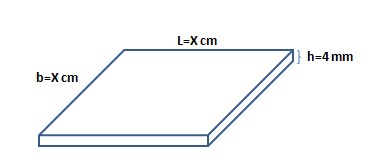
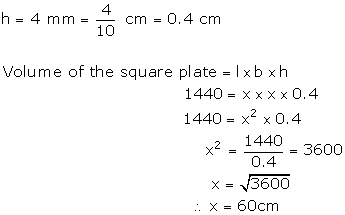
Question 6
The square on the diagonal of a cube has an area of
441 cm2. Find the length of the side and total surface area of the
cube.
Solution 6
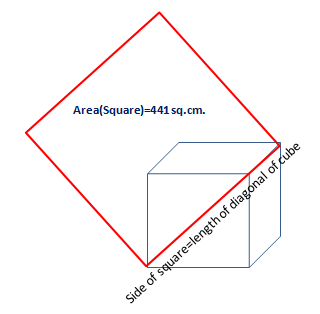
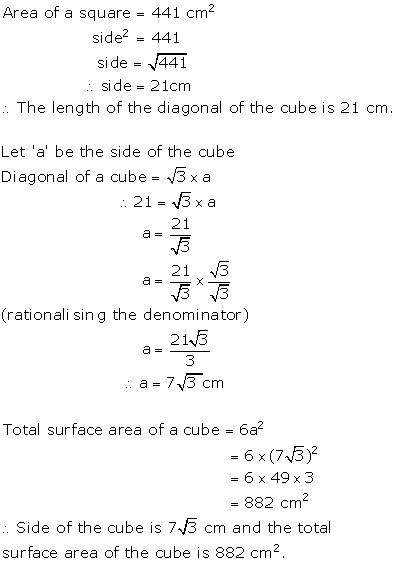
Question 7
Three equal cubes are placed adjacently in a row.
Find the ratio of the total surface area of the resulting cuboid
to that of the sum of the total surface areas of the three cubes.
Solution 7
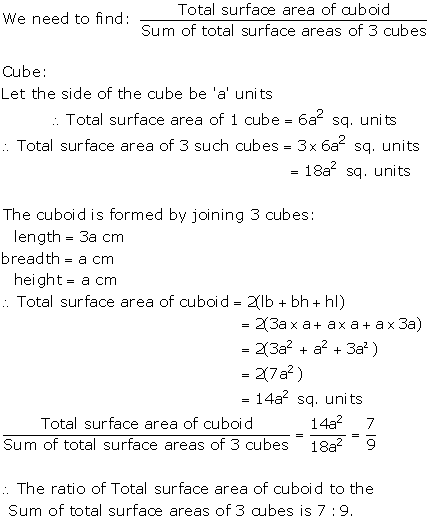
Question 8
A metal cube of side 4 cm is immersed in a water
tank. The length and breadth of the tank are 8 cm and 4 cm respectively. Find
the rise in level of the water.
Solution 8
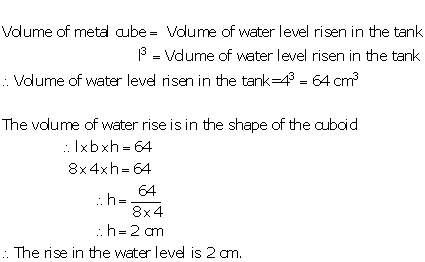
Question 9
A metal piece 6 cm long, 5 cm broad and x cm , high is dropped in a glass box containing water. The
dimensions of the base of the glass box are 18 cm by 8 cm and the rise in
water level is 0.5 cm. Find x.
Solution 9
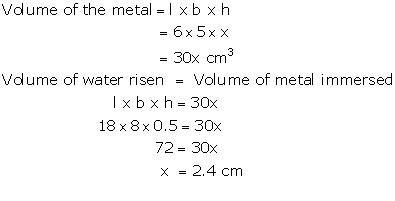
Question 10
A closed box is made of wood 5 mm thick. The
external length, breadth and height of the box are 21 cm, 13 cm and 11 cm
respectively. Find the volume of the wood used in making the box.
Solution 10
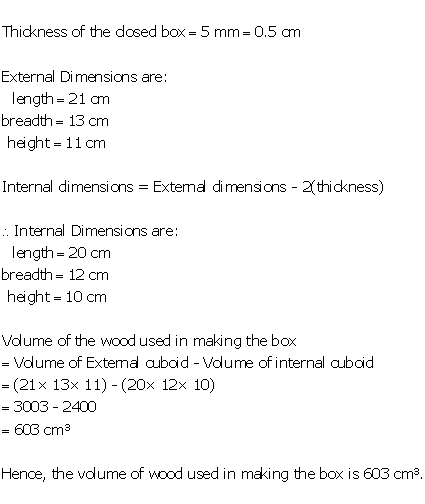
Question 11
The cost of papering the four walls of a room at Rs
1 per m2 is Rs.
210. The height of the room is 5 m. Find the length and the breadth of the
room if they are in the ratio 5:2.
Solution 11
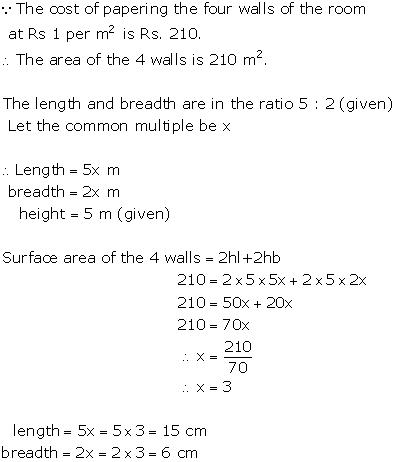
Question 12
Find the volume of wood used in making a closed box
22 cm by 18 cm by 14 cm, using a 1 cm thick wood. Also, find the cost of wood
required to make the box at the rate of Rs. 5 per cm³ How many cubes of side 2 cm can be placed in
the box?
Solution 12
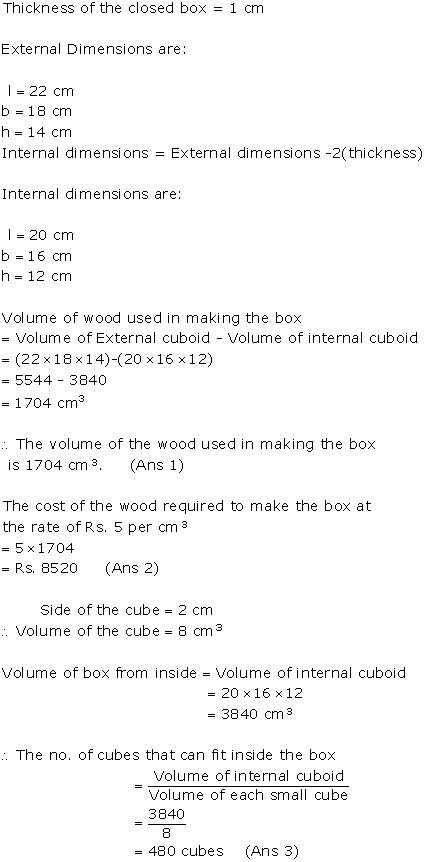
Question 13
A rectangular container has base with dimensions 6
cm x 9 cm. A cube of edge 3 cm is placed in the container and then sufficient
water is filled into it so that the cube is just submerged. Find the fall in
the level of the water in the container, when the cube is removed.
Solution 13
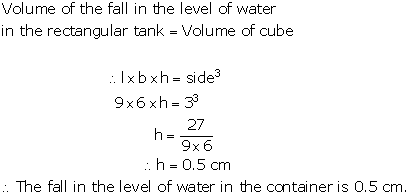
Question 14
The base of a rectangular container is a square of
side 12 cm. This container holds water up to 2 cm from the top. When a cube
is placed in the water and is completely submerged, the water rises to the
top and 224 cm3 of water overflows. Find the volume and surface
area of the cube.
Solution 14
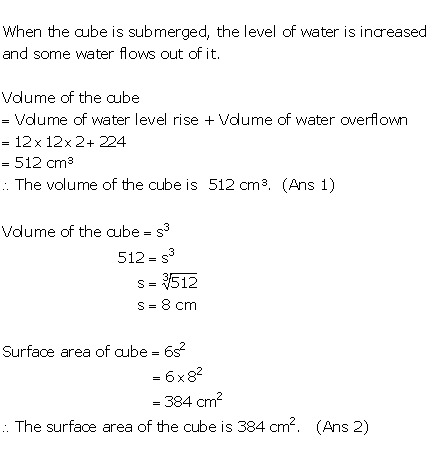
Question 15
Solution 15
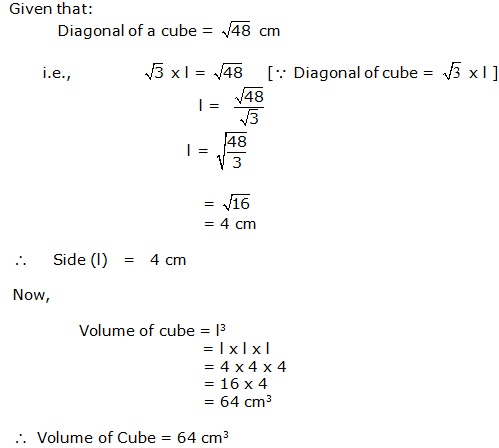
Question 16
Solution 16
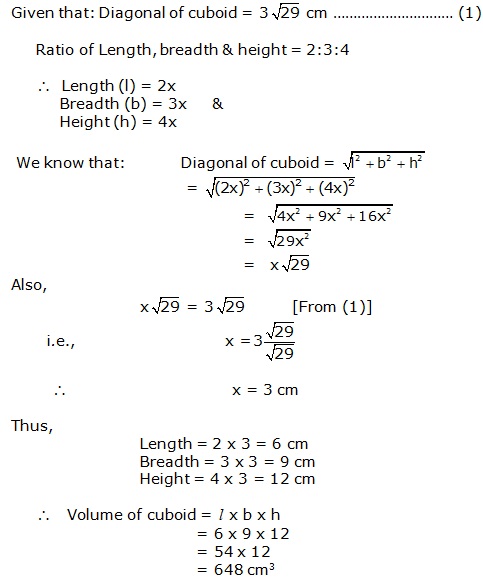
Question 17
Solution 17
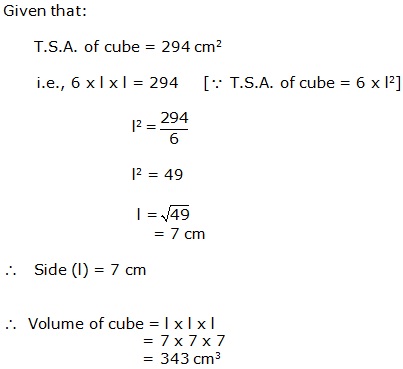
Question 18
Solution 18
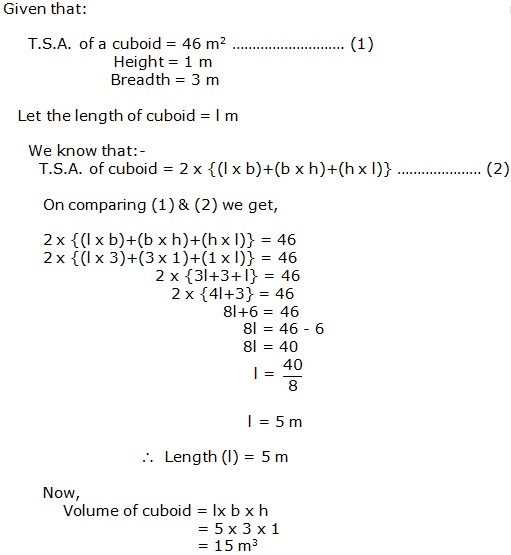
Question 19
Solution 19
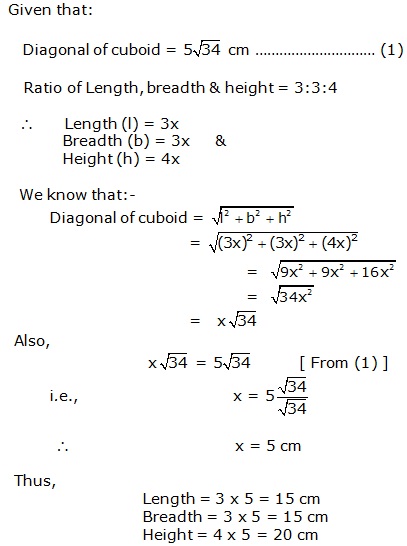

Question 20
Solution 20
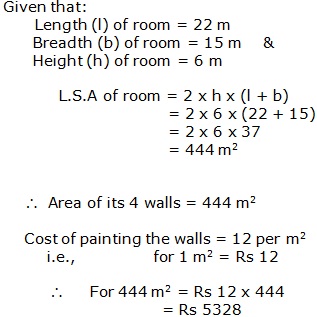
Question 21
Solution 21
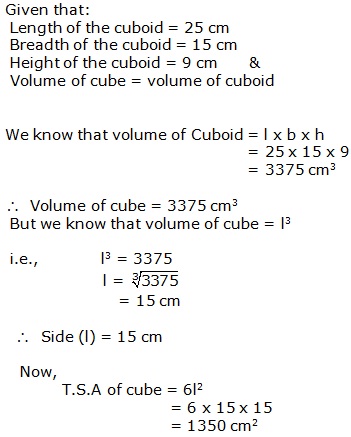
Question 22
Solution 22
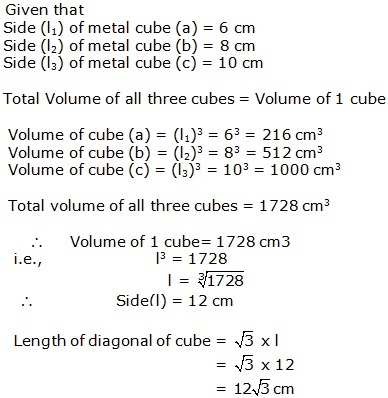
Question 23
Solution 23
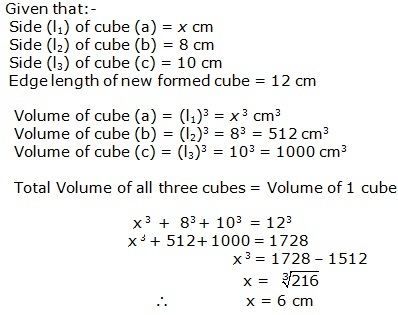
Question 24
Solution 24
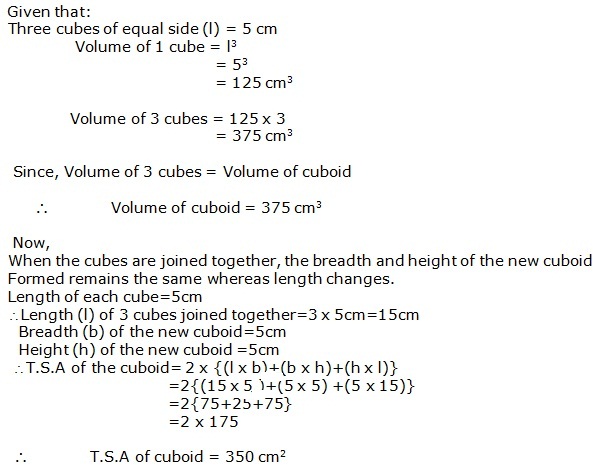
Question 25
Solution 25
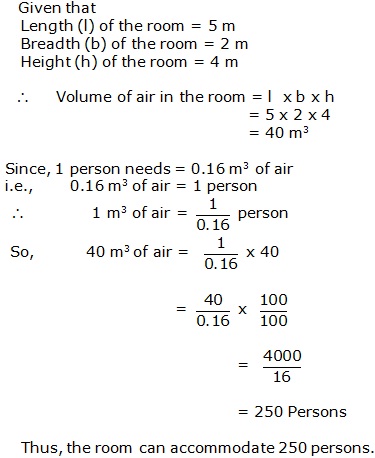
Question 26

Solution 26
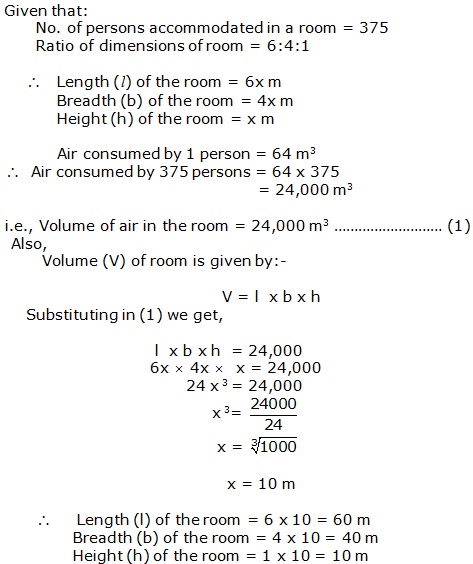
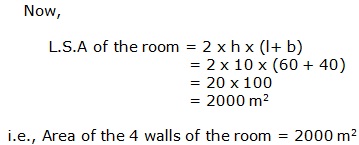
Question 27

Solution 27
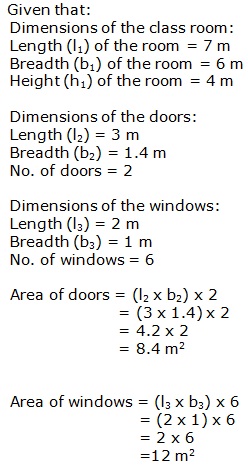
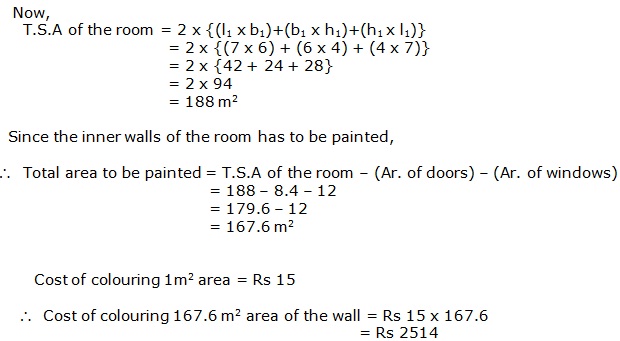
Question 28
Solution 28
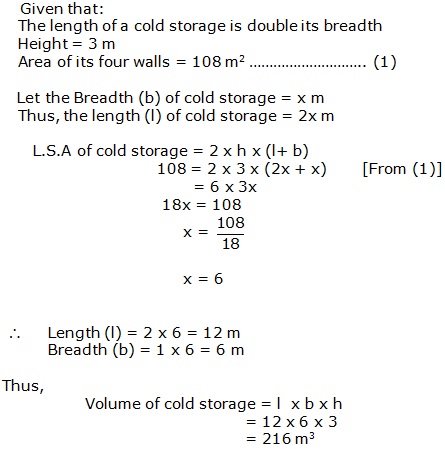
Question 29

Solution 29
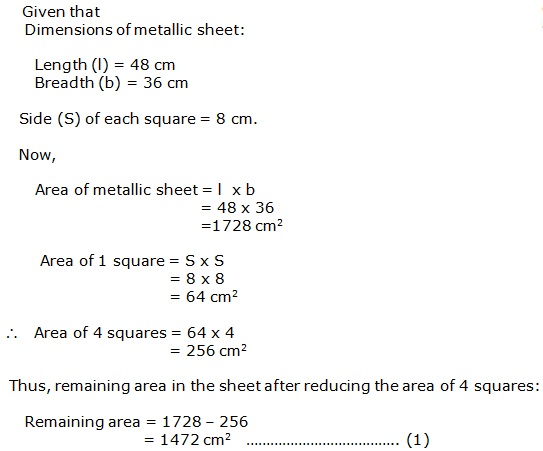
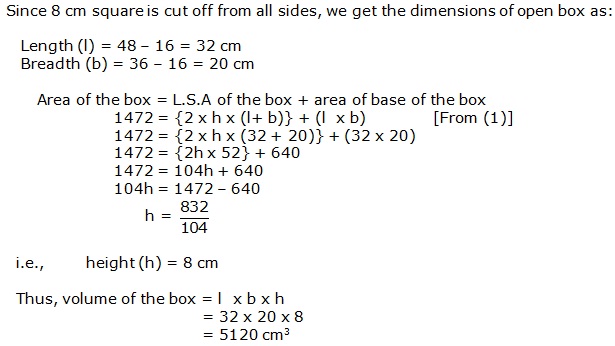
Question 30
Solution 30
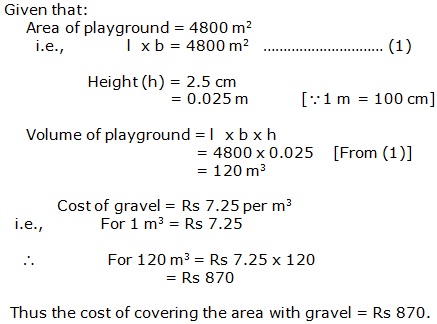
Chapter 25 - Surface Areas and Volume of Solids Exercise Ex. 25.2
Question 1
Find the length of 22 kg copper wire of diameter 0.8
cm, if the weight of 1 cm3 copper is 4.2 g.
Solution 1
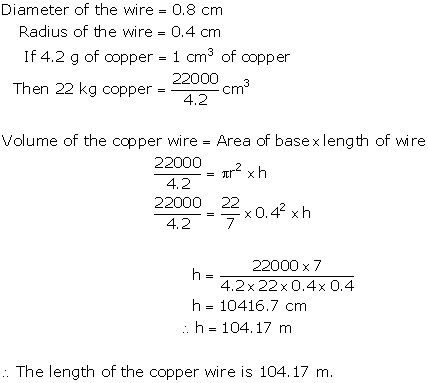
Question 2
Find the length of a solid cylinder of diameter 4 cm
when recast into a hollow cylinder of outer diameter 10 cm, thickness 0.25 cm
and length 21 cm? Give your answer correct to two decimal places.
Solution 2
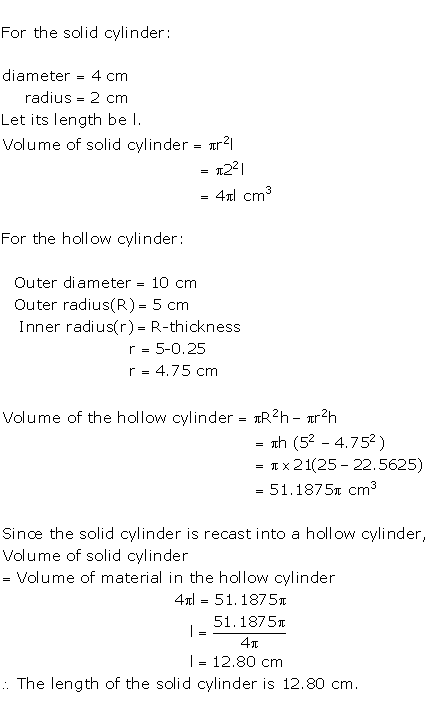
Question 3
A hollow garden roller, 1 m wide with outside
diameter of 30 cm, is made of 2 cm thick iron. Find the volume of the iron.
If the roller rolls without sliding for 6 seconds at the rate of 8 complete
rounds per second, find the distance travelled and the area covered by the
roller in 6 seconds.
Solution 3
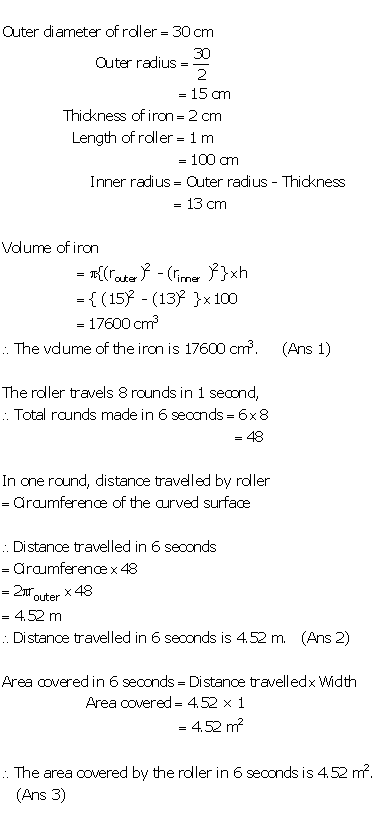
Question 4
A well with 6 m diameter is dug. The earth taken out
of it is spread uniformly all around it to a width of 2 m to form an
embankment of height 2.25 m. Find the depth of the well.
Solution 4
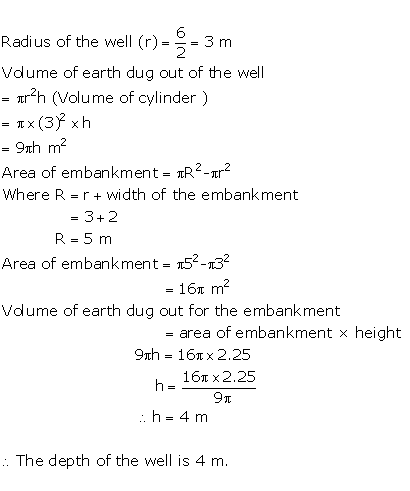
Question 5
A cylindrical container with internal diameter of
its base 20 cm, contains water upto
a height of 14 cm. Find the area of the wet surface of the cylinder.
Solution 5
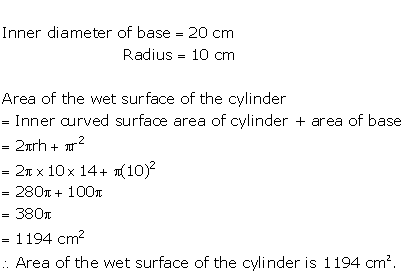
Question 6
The radius of a solid cylinder decreases by 10% and
its height increases by 20%. Find the change in percentage of its volume and
curved surface area
Solution 6
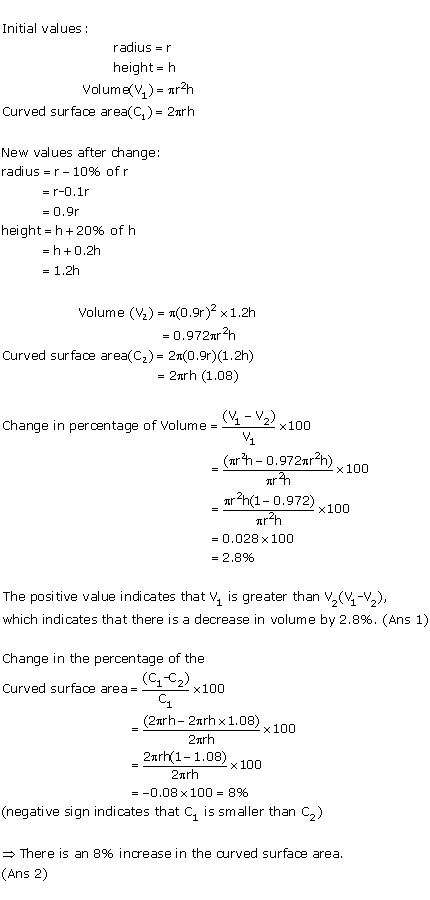
Question 7
From a tap of inner radius 0.80 cm, water flows at
the rate of 7 m/s. Find the volume in litres of
water delivered by the pipe in 75 minutes.
Solution 7
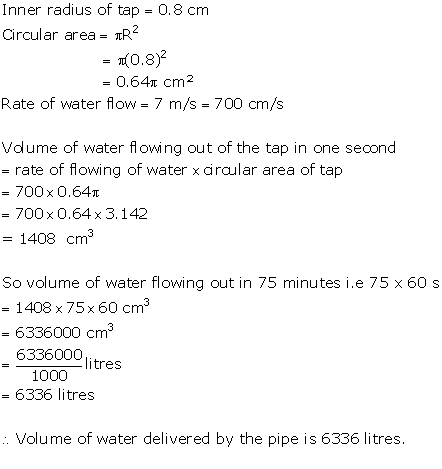
Question 8
A cylindrical water tank has a diameter 4 m and is 6
m high. Water is flowing into it from a cylindrical pipe of diameter 4 cm at
the rate of 10 m/s. In how much time the tank will be filled?
Solution 8
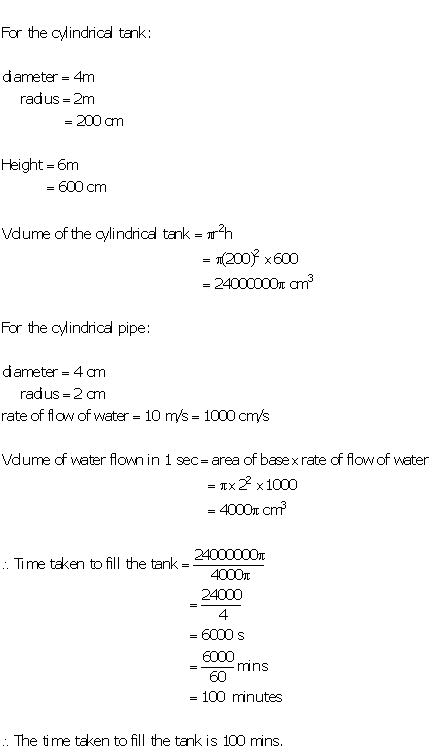
Question 9
The difference between the outer and inner curved
surface area of a hollow cylinder is 264 cm2. If its height is 14
cm and the volume of the material in it is 1980 cm3, find its
total surface area.
Solution 9
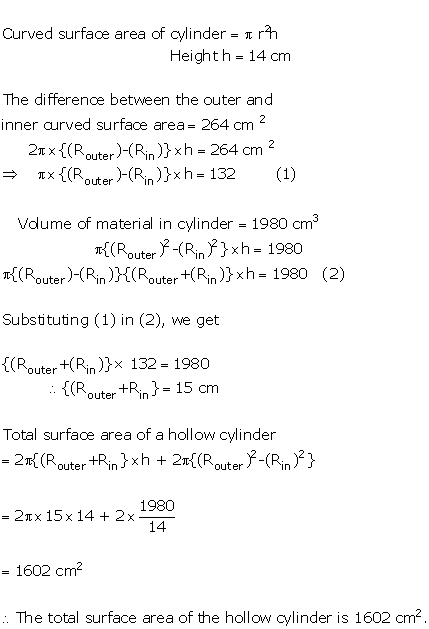
Question 10
The sum of the height and the radius of a cylinder
is 28 cm and its total surface area is 616 cm2, find the volume of
the cylinder.
Solution 10
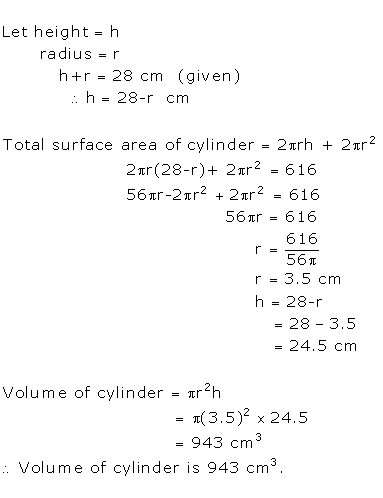
Question 11
A cylindrical tube, open at both ends, is made of
metal. The bore (internal diameter) of the tube is 10.4 cm and its length is
25 cm. The thickness of the metal is 8 mm everywhere. Calculate the volume of
the metal. Also, find the weight of the tube if 1 cm3 of the metal
weighs 1.42 g.
Solution 11
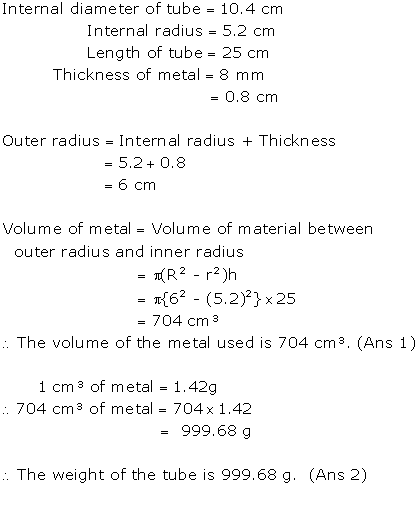
Question 12

Solution 12
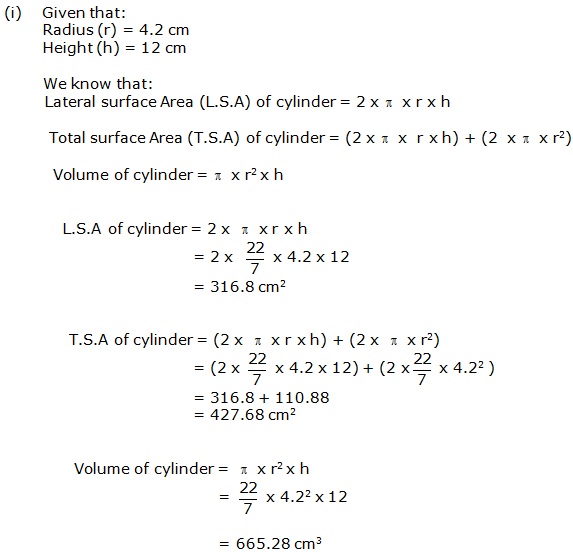
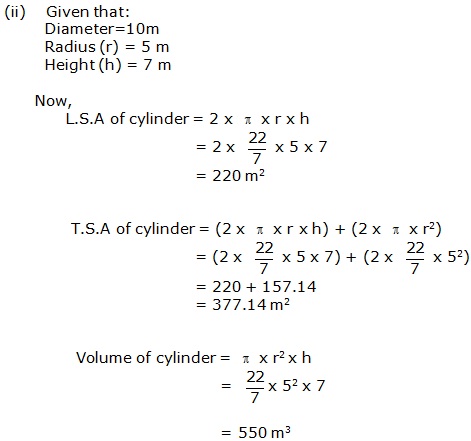
Question 13
Solution 13
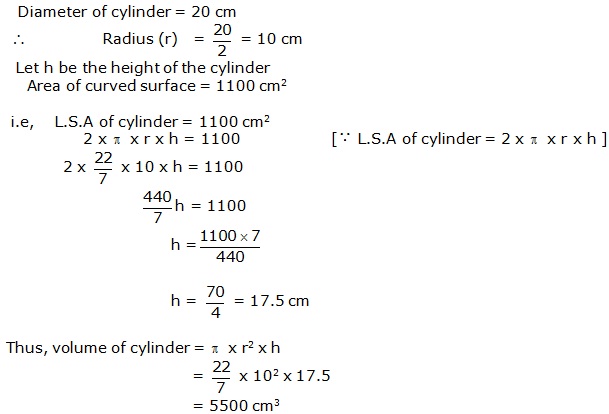
Question 14
Solution 14
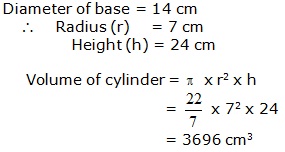
Question 15
Solution 15
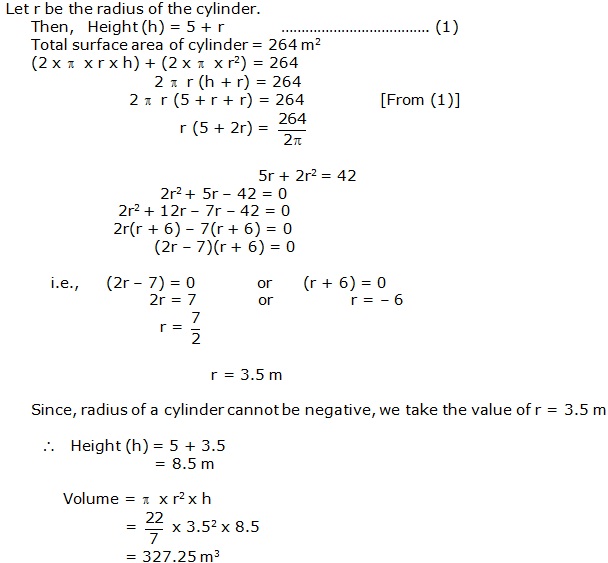
Question 16
Solution 16
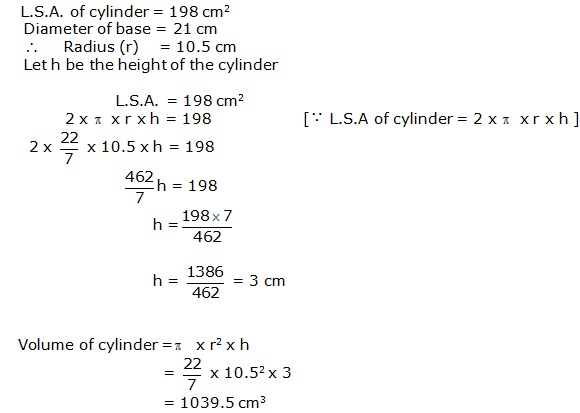
Question 17
Solution 17
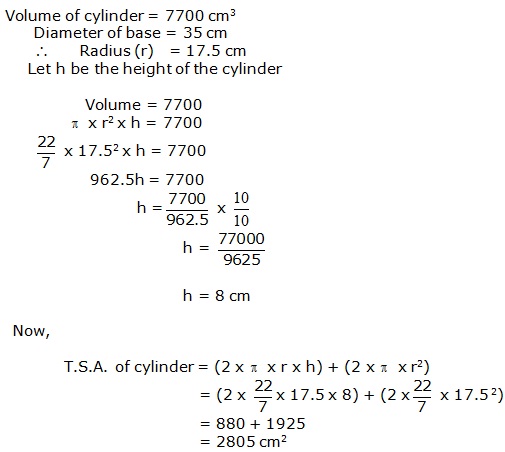
Question 18
Solution 18
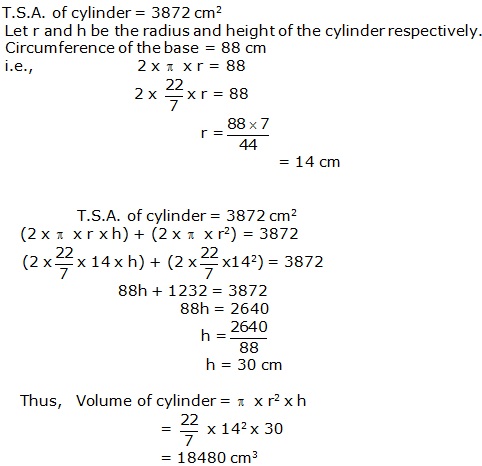
Question 19
Solution 19
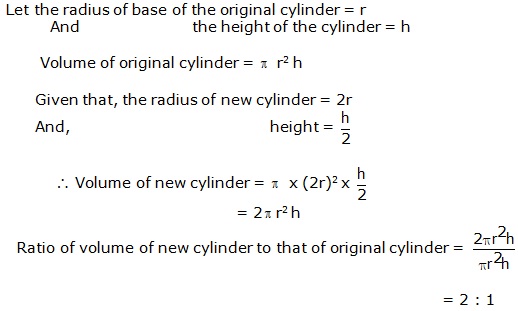
Question 20
Solution 20
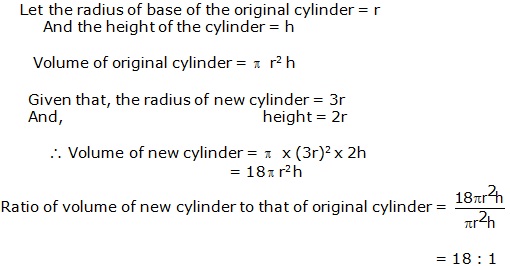
Question 21
Solution 21
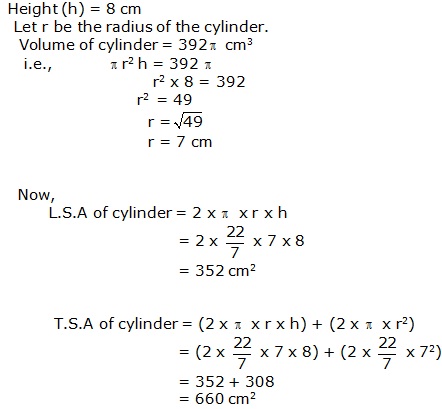
Question 22

Solution 22
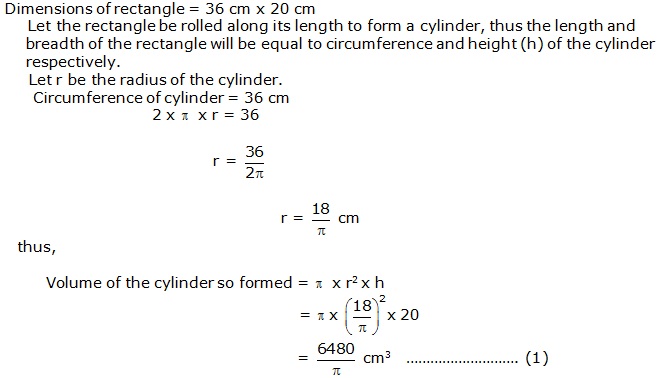
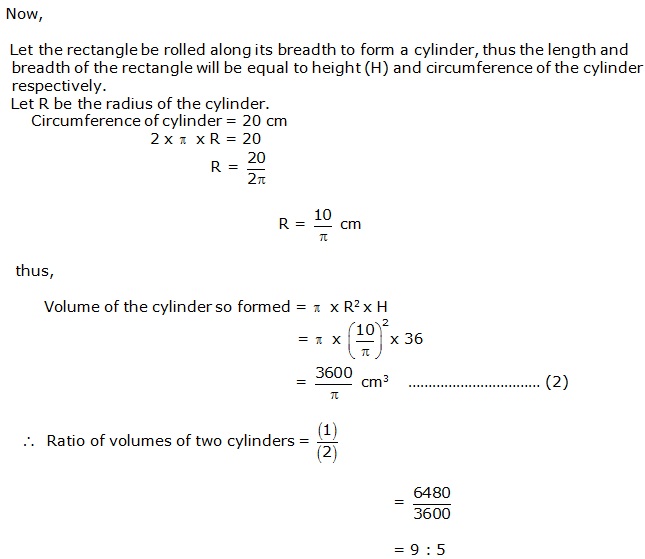
Question 23
Solution 23
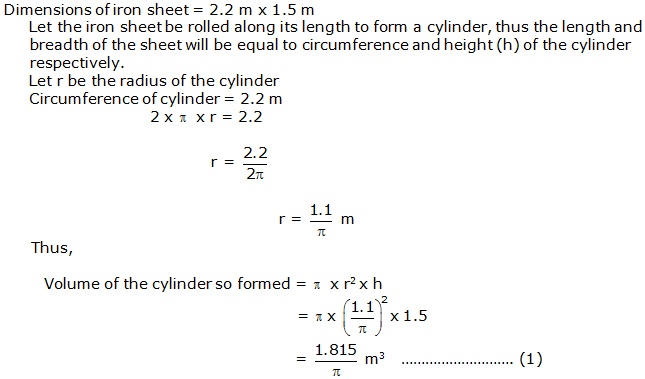
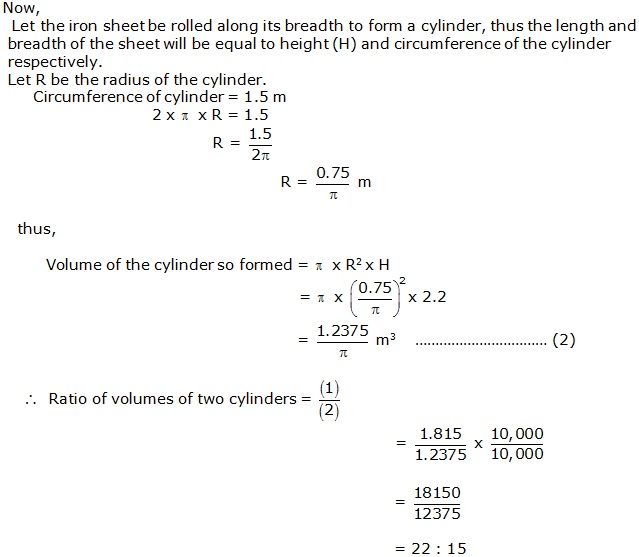
Question 24
Solution 24
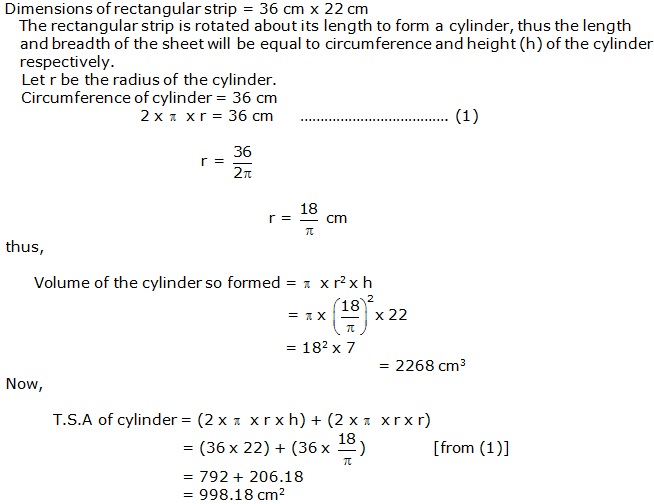
Question 25

Solution 25
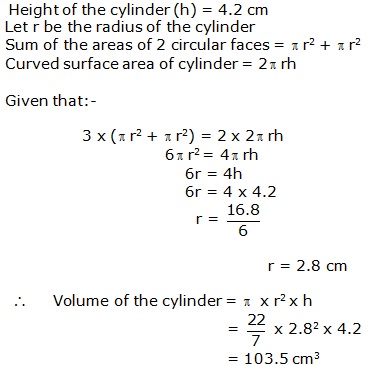
Question 26
Solution 26
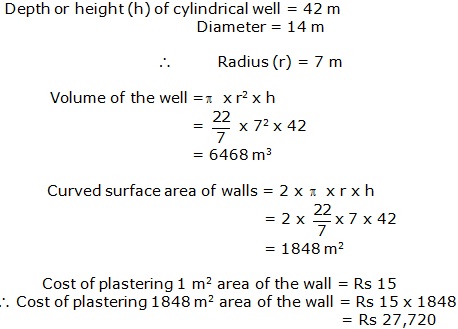
Question 27

Solution 27
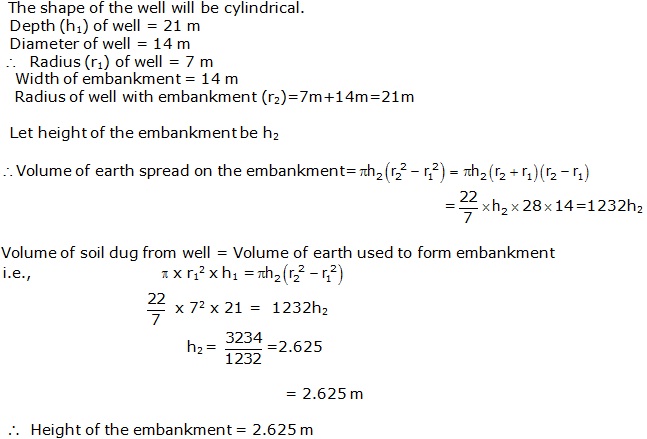
Chapter 25 - Surface Areas and Volume of Solids Exercise Ex. 25.3
Question 1
The cross section of a piece of metal 2 m in length
is shown.
(a) Calculate the area of cross
section.
(b) Calculate the volume of the
piece of metal.
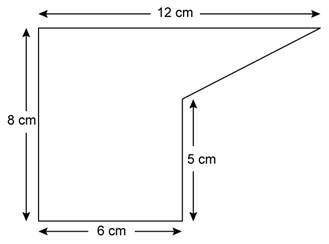
Solution 1
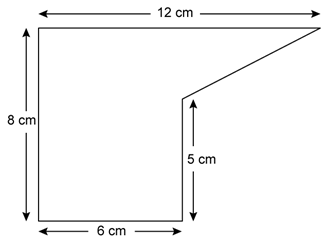
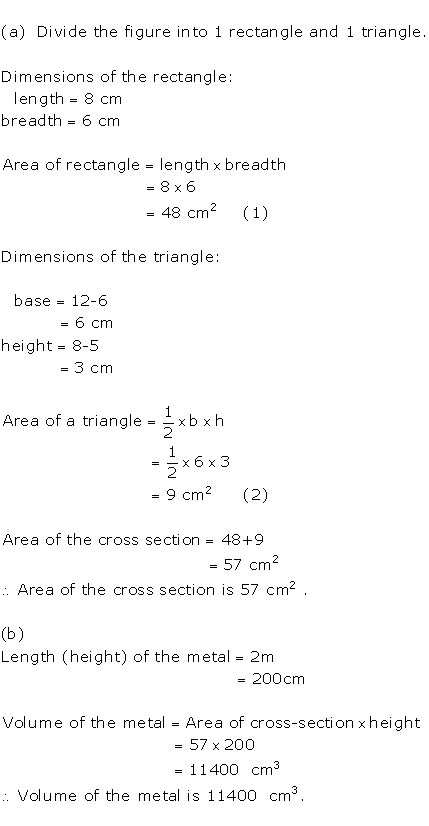
Question 2
The figure represents the cross section of a
swimming pool 10 m broad, 2 m deep at one end, 3 m deep at the other end.
Calculate the volume of water it will hold when full, given that its length
is 40 m.
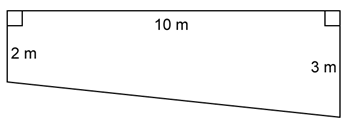
Solution 2
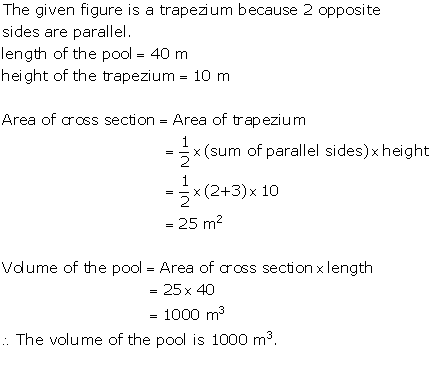
Question 3
The given figure is a cross -section of a victory
stand used in sports. All measurements are in centimetres.
Assume all angles in the figure are right angles. If the width of the stand
is 60 cm, find
(a) The space it occupies in cm3.
(b) The total surface area in m2.
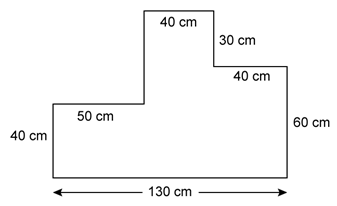
Solution 3
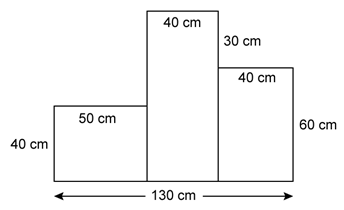
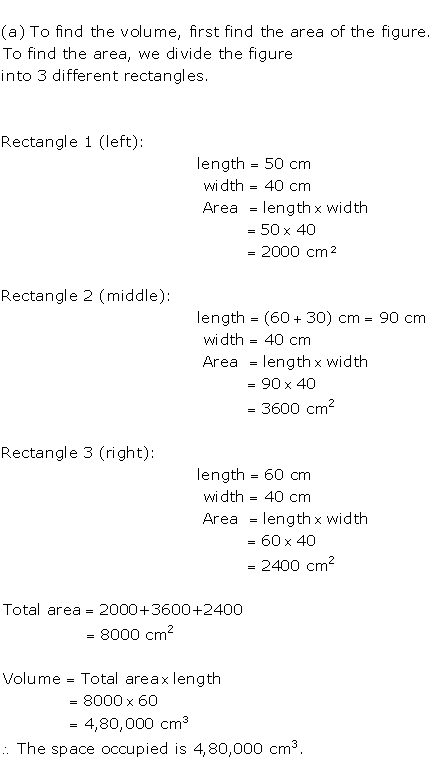
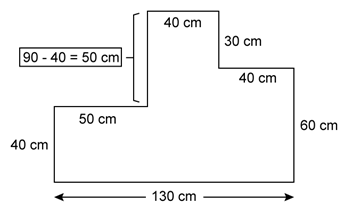
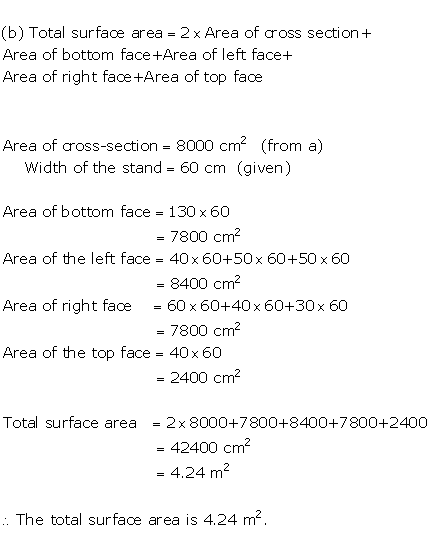
Question 4
Water flows at the rate of 1.5 meters per second
through a pipe with area of cross section 2.5 cm2 into a rectangular water
tank of length 90 cm and breadth 50 cm. Find the rise in water level in the
tank after 4 minutes.
Solution 4
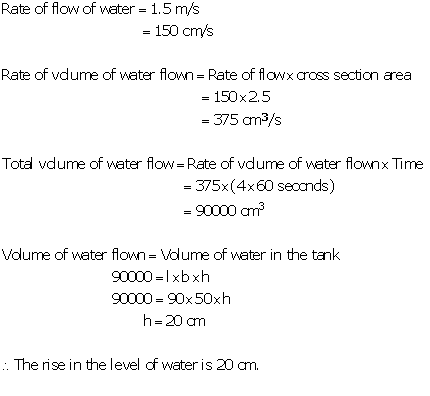
Question 5
A swimming pool is 50 m long and 15 m wide. Its
shallow and deep ends are 1.5 m and 4.5 m respectively. If the bottom of the
pool slopes uniformly, find the amount of water in kilolitres required to
fill the pool (1 m3 = 1000 liters).
Solution 5
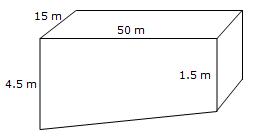
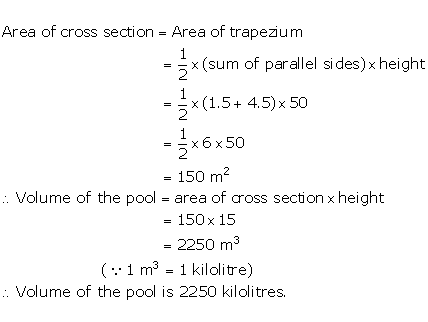
Question 6
Rain falls on a rectangular roof 28 m by 9 m and the
water flows into a tank of dimensions 90 m by 70 cm by 84 cm. How much
rainfall will fill the tank completely?
Solution 6
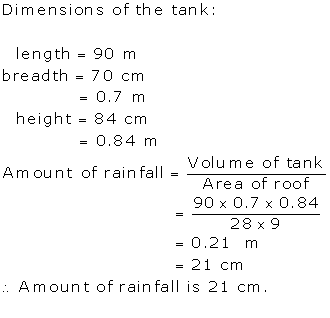
Question 7
The area of cross section of a pipe is 5.4 square cm
and water is pumped out of it at the rate of 27 km per hour. Find, in litres, the volume of water which flows out of the pipe
in 2 minutes.
Solution 7
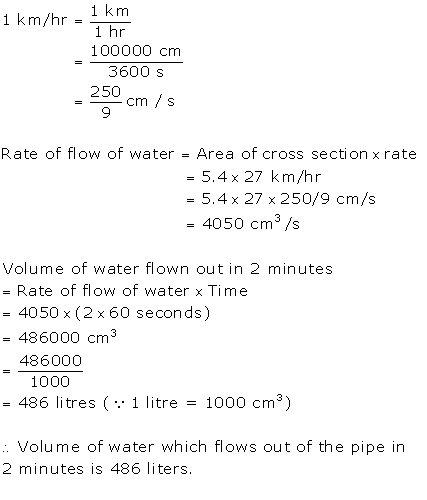
Question 8
The figure shows the cross section of 0.2 m a concrete wall to be constructed. It is 0.2 m wide at the top, 2.0 m wide at the bottom and its height is 4.0 m, and its length is 40 m.
(a) Calculate the cross sectional area
(b) Calculate the volume of the concrete in the wall
(c) If the whole wall is to be painted, find the cost of painting it at 2.50 per sq m.
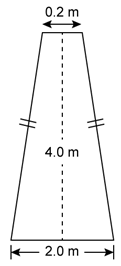
Solution 8
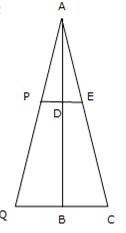
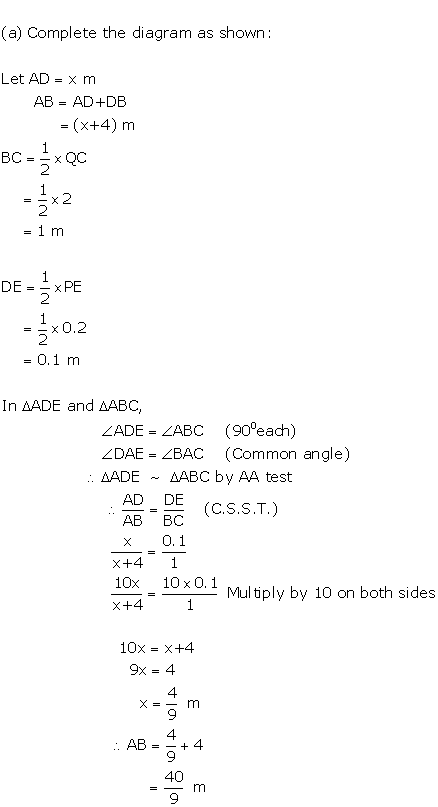
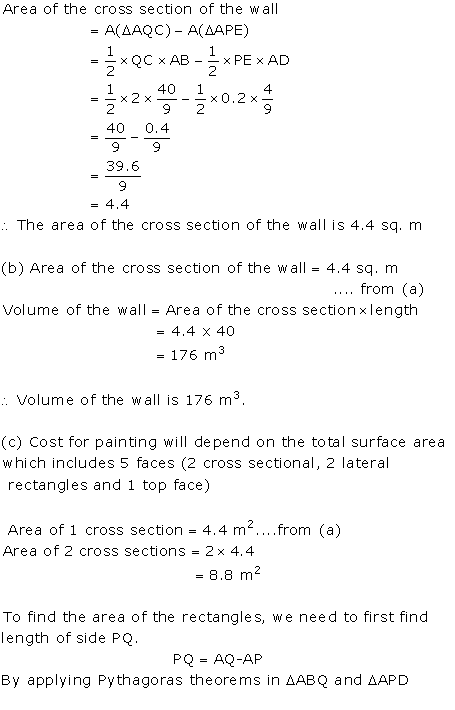
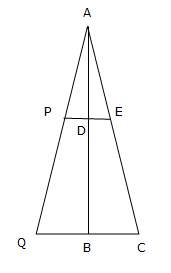
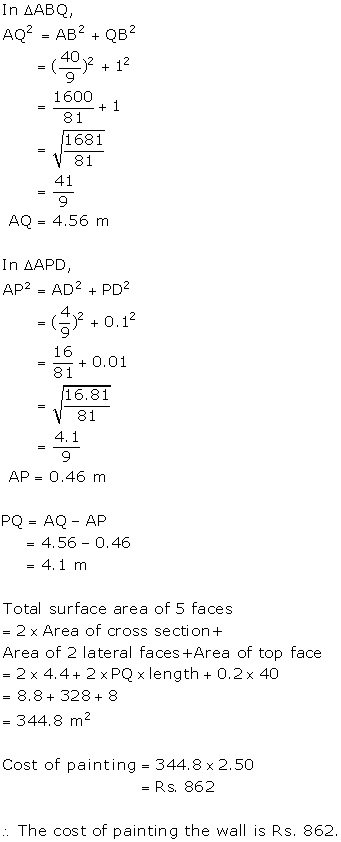
Question 9
The cross section of a tunnel perpendicular to its
length is a trapezium ABCD as shown in the figure. AM = BN; AB = 4.4 m, CD =
3 m The height of a tunnel is 2.4 m. The tunnel is 5.4 m long.
(a) Calculate
the cost of painting the internal surface of the tunnel (excluding the floor)
at the rate of Rs.
5 per m2.
(b) Calculate
the cost of flooring at the rate of Rs.2. 5 per m2.
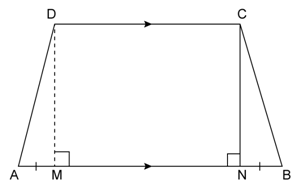
Solution 9
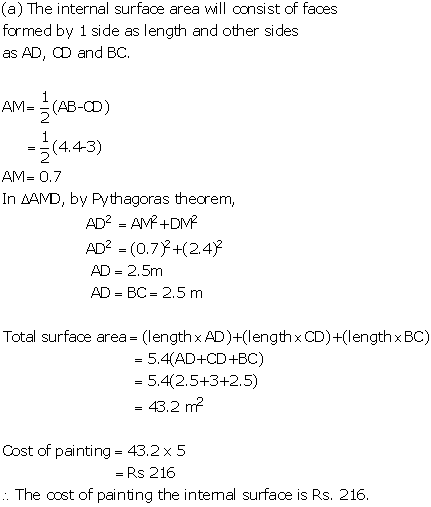
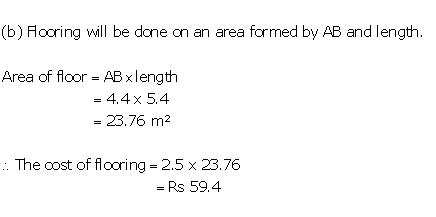
Question 10
ABCDE is the end view of a factory shed which is 50
m long. The roofing of the shed consists of asbestos sheets as shown in the
figure. The two ends of the shed are completely closed by brick walls.

(a) Calculate
the total volume content of the shed.
(b) If
the cost of asbestos sheet roofing is Rs. 20 per m2, find the cost of roofing.
(c) Find
the total surface area (including roofing) of the shed.
Solution 10
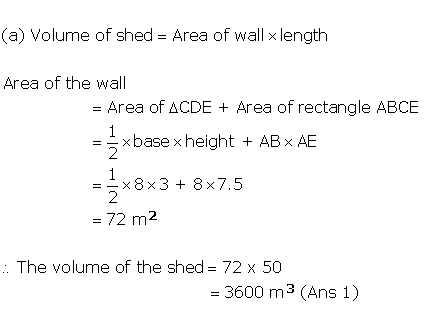
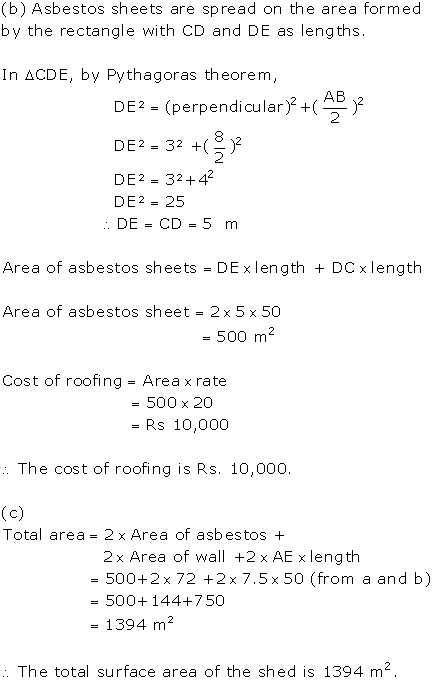
Question 11
The cross section of a swimming pool is a trapezium whose shallow and deep ends are 1 m and 3 m respectively.
If the length of the pool is 50 m and its width is 1.5 m, calculate the
volume of water it holds.
Solution 11
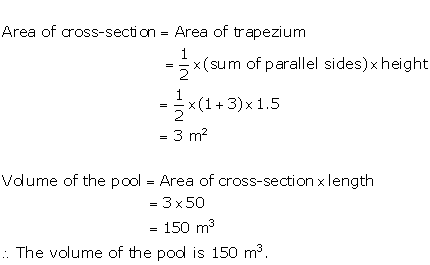
Question 12
A hose-pipe of cross section area 3 cm2
delivers 1800 liters of water in 10 minutes. Find the speed of water in km/h
through the pipe.
Solution 12
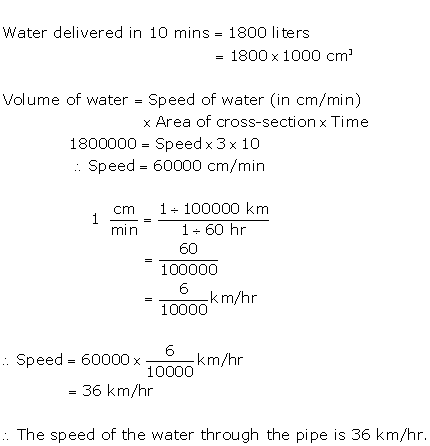
Question 13
The cross section of a canal is a trapezium with the
base length of 3 m and the top length of 5 m. It is 2 m deep and 400 m long.
Calculate the volume of water it holds.
Solution 13
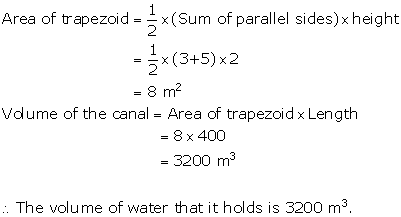
Question 14
A rectangular water tank measuring 8mx6mx 4 cm is
filled from a pipe of cross sectional area 1.5 cm2, the water
emerging at 10 m/s. How long does it take to fill the tank?
Solution 14
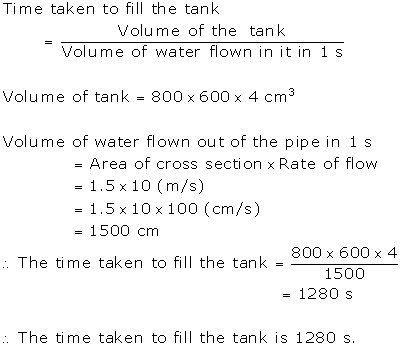
Question 15
How many liters of water will flow out of a pipe
having a cross sectional area 6 cm2 in one hour, if the speed of
water in the pipe is 30 cm/sec?
Solution 15
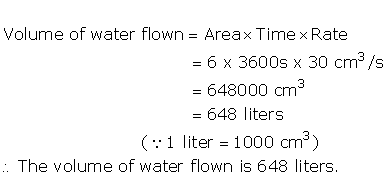

0 comments:
Post a Comment